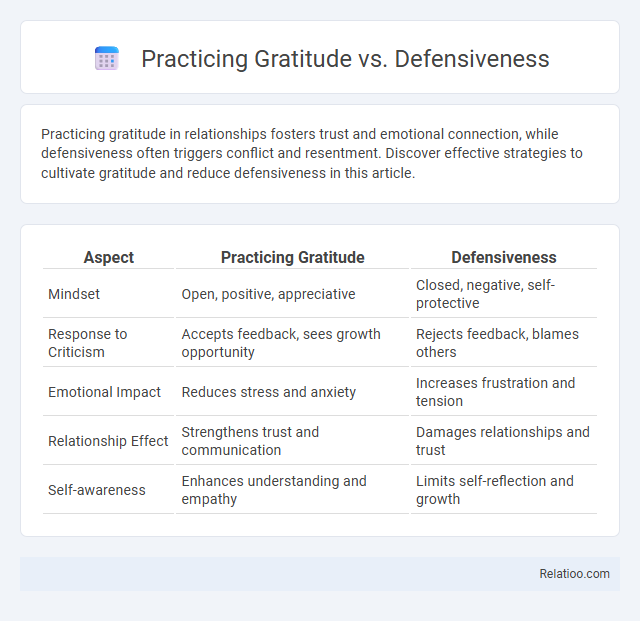Practicing gratitude in relationships fosters trust and emotional connection, while defensiveness often triggers conflict and resentment. Discover effective strategies to cultivate gratitude and reduce defensiveness in this article.
Table of Comparison
| Aspect | Practicing Gratitude | Defensiveness |
|---|---|---|
| Mindset | Open, positive, appreciative | Closed, negative, self-protective |
| Response to Criticism | Accepts feedback, sees growth opportunity | Rejects feedback, blames others |
| Emotional Impact | Reduces stress and anxiety | Increases frustration and tension |
| Relationship Effect | Strengthens trust and communication | Damages relationships and trust |
| Self-awareness | Enhances understanding and empathy | Limits self-reflection and growth |
Understanding Gratitude: A Positive Mindset
Understanding gratitude cultivates a positive mindset by emphasizing appreciation for present experiences and fostering emotional resilience. Practicing gratitude shifts focus from defensiveness, reducing negative reactions to criticism and promoting empathy and openness. Consistent gratitude habits enhance mental well-being, support healthier relationships, and encourage adaptive responses to challenges.
Defensiveness: Root Causes and Impact
Defensiveness often stems from fear of judgment, insecurity, or past emotional wounds, leading individuals to respond to feedback with resistance rather than openness. This protective mechanism hampers personal growth and strains relationships by creating barriers to effective communication and understanding. Fostering gratitude shifts focus from perceived threats to appreciation, reducing defensive reactions and promoting emotional resilience and healthier interactions.
Emotional Benefits of Practicing Gratitude
Practicing gratitude significantly enhances emotional well-being by fostering positive emotions such as happiness, contentment, and reduced stress levels, which contrasts sharply with the emotional toll of defensiveness that often leads to increased anxiety and interpersonal conflicts. Research from the Journal of Positive Psychology highlights that individuals who regularly engage in gratitude exercises report higher levels of life satisfaction and lower symptoms of depression compared to those exhibiting defensive behaviors. Emphasizing gratitude cultivates resilience and emotional stability, creating a healthier mental state and improving overall psychological health.
The Psychological Toll of Defensiveness
Defensiveness triggers the brain's stress response, increasing cortisol levels and impairing emotional regulation, which contributes to heightened anxiety and decreased psychological resilience. In contrast, practicing gratitude activates neural circuits associated with reward and positive affect, promoting neuroplasticity and reducing the impact of stress hormones. Prioritizing gratitude over defensiveness supports mental health by enhancing emotional stability and fostering adaptive coping mechanisms.
How Gratitude Transforms Relationships
Practicing gratitude strengthens relationships by fostering positive communication, increasing empathy, and reducing defensiveness, which often leads to misunderstandings and conflicts. Your consistent acknowledgment of others' efforts cultivates trust and emotional connection, transforming interactions into supportive and nurturing experiences. Embracing gratitude shifts the focus from blame to appreciation, ultimately enhancing the quality and resilience of your relationships.
Defensiveness and Its Effect on Communication
Defensiveness in communication triggers misunderstandings, escalating conflicts and blocking effective dialogue. Practicing gratitude fosters empathy and openness, reducing the urge to defend and allowing your messages to be received constructively. Your ability to replace defensiveness with appreciation significantly improves relationships and promotes clearer, more positive interactions.
Cultivating Gratitude: Practical Steps
Cultivating gratitude involves intentional practices such as daily reflection on positive experiences, journaling three things you are thankful for, and expressing appreciation towards others. This approach enhances emotional resilience by reducing defensiveness, which often stems from feeling threatened or insecure. Consistent gratitude practice rewires the brain for positivity, fostering healthier relationships and improved mental well-being.
Overcoming Defensiveness: Strategies for Change
Overcoming defensiveness requires intentional strategies that include practicing gratitude to shift your mindset away from self-protection and toward openness. Cultivating gratitude helps you recognize positive intentions in others, reducing reactive defensiveness and fostering constructive communication. By integrating gratitude practices, you can transform defensive patterns into opportunities for growth and connection.
Gratitude vs Defensiveness: Real-Life Examples
Gratitude and defensiveness shape interpersonal dynamics differently, influencing conflict resolution and emotional well-being. Practicing gratitude encourages openness and collaboration, as seen in workplace feedback sessions where appreciative responses foster trust and productivity. In contrast, defensiveness can escalate tensions, often demonstrated in personal relationships when criticism triggers blame, reducing communication effectiveness and increasing stress.
Choosing Growth: Embracing Gratitude Over Defensiveness
Choosing growth involves embracing gratitude over defensiveness, fostering a mindset that values learning and positive change. Practicing gratitude enhances emotional resilience and strengthens relationships by shifting focus from criticism to appreciation. Defensiveness hinders personal development by blocking constructive feedback, whereas gratitude encourages openness and continuous self-improvement.

Infographic: Practicing gratitude vs Defensiveness
 relatioo.com
relatioo.com